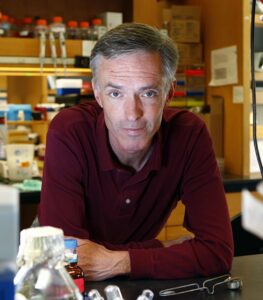James J. Collins
Biography
The work of James J. Collins on synthetic gene networks and programmable cells led to the development of innovative diagnostics and therapeutics for detecting and treating complex diseases, including cancer and infections. More than twenty years ago, Collins recognized the potential of applying engineering design principles to molecular biology. He was the first to demonstrate that biochemical and biophysical properties of nucleic acids and proteins can be harnessed to create biological circuits, designing a genetic toggle switch in E. coli. This landmark work, published in Nature, laid the foundation for the synthetic biology field. Building on this breakthrough, Collins showed how synthetic gene networks can be used as regulatory modules, interfacing with a microbe’s genetic circuitry to create programmable cells for biomedical applications. He developed live biotherapeutics, known as synthetic biotics, capable of detecting and treating infections like cholera and preventing antibiotic-induced gut dysbiosis and its associated pathologies. Collins also devised a method to freeze-dry synthetic gene networks onto paper, creating a cost-effective platform for molecular diagnostics to detect pathogens like Ebola, Zika, and SARS-CoV-2. His diagnostic tests have been utilized globally, aiding in disease detection and control. Moreover, he demonstrated that his freeze-dried, cell-free synthetic biology platform can be used for on-demand biomolecular manufacturing, such as producing vaccine antigens in resource-limited regions without the need for a cold chain distribution. Collins’ pioneering contributions have significantly advanced the field of synthetic biology, revolutionized biomedicine, and enhanced our ability to detect and treat infections. His innovative work is making a positive impact on global health, improving the lives of countless individuals.
Collins is the Termeer Professor of Medical Engineering & Science, Massachusetts Institute of Technology, Cambridge, Massachusetts, USA and is the 2025 recipient of the IEEE Medal for Innovations in Healthcare Technology “For contributions to synthetic gene circuits and programmable cells, launching the field of synthetic biology, impacting healthcare applications.”.
